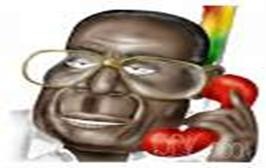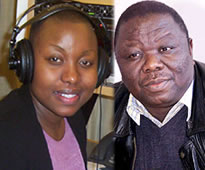Zimbabwe: Not Much Has Changed, So Mugabe Stays On
COLUMN
8 May 2007
Posted to the web 8 May 2007
Karl Limo
Nairobi
A certain boxer, I forget which, when asked if he was not scared fighting a challenger nearly twice his size, replied curtly: "The bigger they come, the harder they fall!" I am not going to say the same regarding Zimbabwe President Robert Mugabe who, after 27 years of rule, effectively brought his country to its knees.
When I heard Mugabe over the radio in the early 1980s, he sounded so articulate that my admiration of the man was instant. And, when I learnt that he had seven University degrees and certificates, I thought to myself: This is the kind of person I would gladly have as my president.
WITH TIME however, I am not under the same spell because of how he has turned Zimbabwe - once one of the region's breadbaskets, into one of Africa's basket cases. Today, Mugabe has few genuine sympathisers, but a growing number of denigrators and detractors.
Inflation is officially fixed at 1,700 per cent, but raging at around 4,000 per cent in real terms - the highest anywhere in the world!
It is estimated that nearly a quarter of the country's 12 million people has fled, or are on their way out, just to survive. Others are escaping political persecution and hounding by the authorities, including the military which, still answers to Mugabe!
BUT, IF the bigger they come, the harder they fall, why is "Big Mugabe" not falling from power at all - let alone hard? At 83 years and still boisterously intransigent, the man has decidedly fallen from grace.
Charles Onyango-Obbo, has posited why "African strongmen tend to seem more powerful and entrenched at the point when their political record is at its worst."
Taking Idi Amin's Uganda (1971-79), he reasons that, "When an economy collapses, the few parts of it that are still working are almost always in the hands of regime officials and supporters. The opposition supporters have nothing and, therefore, they can't fund anti-government policies ?" ('Mugabe is full of passionate certainty, the rest lack conviction')
In other words, the Opposition needs an economy that is doing well (so as) to thrive. How true!
But, this only applies to the internal opposition. What about those who oppose the regime's heavy-handed policies, programmes and protracted political peccadilloes on the outside, like the West?
What about those in Africa? What about their regional and continental blocs? We have the African Union and the Southern African Development Committee (SADC) in place. The latter met in Dar es Salaam on March 29 and gave South Africa President Thabo Mbeki the task of resolving the "Zimbabwe Crisis."
Apartheid South Africa looked the other way when Ian Smith unilaterally declared independence for Southern Rhodesia from Britain in 1965. The same applies today only that the players have changed, and the country is now Zimbabwe!
THE ORGANISATION of African Unity (OAU) - AU's forerunner - had many military dictators. Nothing much has changed, and today Mugabe gets a standing ovation at AU gatherings.
Speaking at the University of Edinburgh, in 1997 the late Mwalimu Julius Nyerere said: "I once described the OAU as a Trade Union of African Heads of State. We protected one another against whatever we did to our own people in our respective countries. To condemn a Mobutu, or Idi Amin or a Bokassa was taboo! It would be regarded as interference in the internal affairs of a fellow African State!"
What has changed from OAU (May 25, 1963-July 9, 2002) to AU today? Can Mugabe truly be said to be on his last legs?
Karl Lyimo is a freelance journalist based in Dar.
Yahoo! Answers - Got a question? Someone out there knows the answer.
Try it now.





No comments:
Post a Comment